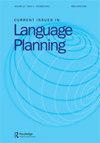阿拉伯高等教育的可持续性与教育语言政策:Q研究结果
IF 1.8
1区 文学
Q2 EDUCATION & EDUCATIONAL RESEARCH
引用次数: 0
摘要
摘要本研究考察了阿拉伯世界的高等教育机构是否采取了促进语言可持续性的方法。具体而言,我们使用Q方法探讨了30名毕业生对高等教育期间实施的教育语言政策是否对他们毕业后的幸福感产生积极影响的看法。根据他们的优先事项,毕业生们整理了29份陈述,阐述了大学教育语言政策的一些社会、文化和经济影响。结果显示,毕业生们采取了四种不同的立场,这些立场被贴上了代表他们普遍情绪的标签:我们应该得到更好的,我们想要更多,这已经足够了,但不是一切,我们不能抱怨。本研究的结论是,在这些毕业生的高等教育中,有三个主要的语言学领域被忽视了:语言与身份、作为第二语言学习结构的投资和平行语言主义。我们坚持认为,高等教育机构可以通过解决这些不足等问题,为阿拉伯毕业生提供更可持续的语言体验。本文章由计算机程序翻译,如有差异,请以英文原文为准。
Sustainability and educational language policy in Arab higher education: findings from Q research
ABSTRACT
This study examined whether institutions of higher education in the Arab world have adopted approaches that promote linguistic sustainability. Specifically, we used Q methodology to explore 30 graduates’ perceptions of whether the educational language policies in force during their tertiary education positively impacted their wellbeing after graduation. Based on their priorities, the graduates sorted 29 statements that articulated some of the social, cultural and economic impacts of their universities’ educational language policies. The results show that graduates took four distinct positions, which were given labels representing their general sentiments: We deserved better, We wanted more, It was enough but not everything and We cannot complain. This study concludes that three main linguistic areas were neglected in these graduates’ tertiary studies: language and identity, investment as a second language learning construct and parallellingualism. We maintain that higher education institutions could provide a more sustainable linguistic experience for Arab graduates by addressing these shortcomings, among others.
求助全文
通过发布文献求助,成功后即可免费获取论文全文。
去求助
来源期刊

Current Issues in Language Planning
Multiple-
CiteScore
4.80
自引率
16.70%
发文量
26
期刊介绍:
The journal Current Issues in Language Planning provides major summative and thematic review studies spanning and focusing the disparate language policy and language planning literature related to: 1) polities and language planning and 2) issues in language planning. The journal publishes four issues per year, two on each subject area. The polity issues describe language policy and planning in various countries/regions/areas around the world, while the issues numbers are thematically based. The Current Issues in Language Planning does not normally accept individual studies falling outside this polity and thematic approach. Polity studies and thematic issues" papers in this journal may be self-nominated or invited contributions from acknowledged experts in the field.
 求助内容:
求助内容: 应助结果提醒方式:
应助结果提醒方式:


